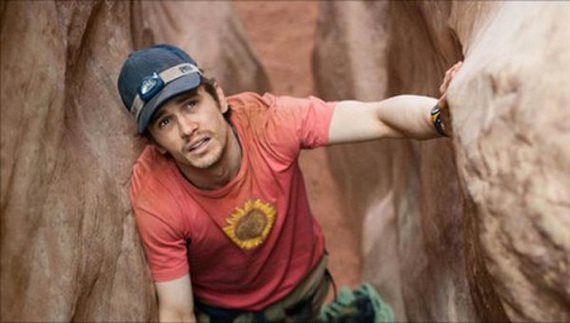Review: 127 Hours
As demonstrated by his ability to earn acclaim in everything from zombie films (“28 Days Later”) to foreign coming-of-age love stories (“Slumdog Millionaire”), Danny Boyle has an extraordinary gift as a filmmaker and in “127 Hours,” he channels it into an extraordinary story of human willpower. This could have easily been a compelling but plain and ordinary documentary on the Discovery Channel or National Geographic about a man pinned under a boulder who miraculously survives. Boyle, however, transforms it into a powerful statement about the will to live and where that motivation truly comes from.
“127 Hours” does not simply prove the point that humans will do whatever it takes to survive in dire circumstances. In fact, I might argue 9 of 10 people wouldn’t do what Aron Ralston (James Franco) does in this film. Anyway, Boyle makes it his mission to use Ralston’s incredible true story — one that told at face value would probably just elicit gasps — to alter our perspective on living.
What’s obvious is that none of the impact of “127 Hours” is possible without Franco. A film about a man trapped in a crevice for more than five days needs a heck of a lead actor and Franco, despite few dramatic credits to this point, proves beyond capable. Although boredom might set in for some during this film given its plot, the believability of Franco’s performance remains constant and irrefutable. He possesses the fun-loving and care-free charisma of Ralston then slowly breaks that shell and shows his human fragility.
Yet remarkably, Boyle leaves a substantial thumbprint on the film, much of which he shares with co-writer Simon Beaufoy, also of “Slumdog.” Because the story is so straightforward, Boyle recognizes imagery and perception provide his only means of creativity. He shows us inside the tube of Ralston’s water backpack, water bottle and other close-ups, all of which seem unnecessary, but they establish images which we will come to think about with a different perspective as the film wears on, such as when Aron drinks his own settled urine out of the water pouch. Boyle uses the same process shot, but suddenly we don’t see it the way we did earlier and they become more meaningful than tedious.
This subtly effective technique can also be found in the beginning and ending shots of the film. It seems completely random that Boyle would open with crowded streets of people as if he’s tricked us and really made “Slumdog 2,” but the image gains significance after experiencing Ralston’s journey.
“127 Hours” will not be kind to people who don’t take lightly to seeing blood outside of the “shoot ’em up” genre. Many of these people will leave the film thinking all they got was shock value, but of course there’s much more to it. Despite the “how will he survive?” plot, a substantial amount of time is placed on flashes to memories Aron thinks of regarding his family, fantasies and of course, regrets. Boyle beautifully shows us that although survival seems an inherently selfish thing, much of that motivation and will to live comes from other people, even total strangers. Aron thinks a lot of the girls (Kata Mara and Amber Tamblyn) he hiked with just hours before the accident though otherwise he’d have likely forgotten them.
The build-up and catharsis of Aron’s story might not be the most powerful and uplifting based-on-true-story you’ve witnessed, but “127 Hours” clearly surpasses expectation in terms of the message it sends and the impact it leaves. With it, Boyle solidifies his place as one of those filmmakers you must always have an eye on and Franco emerges as a relatable everyman with above-everyman-grade talent.
—
4.5/5 Stars
—
127 Hours
Directed by Danny Boyle
Written by Simon Beaufoy and Danny Boyle , Aron Ralston (book)
Starring: James Franco, Kate Mara, Amber Tamblyn





0 Comments
You can be the first one to leave a comment.